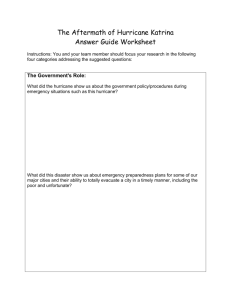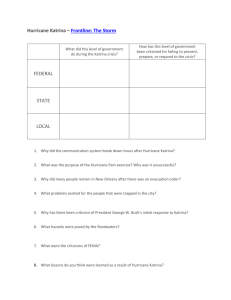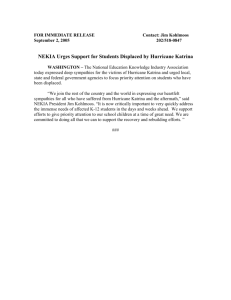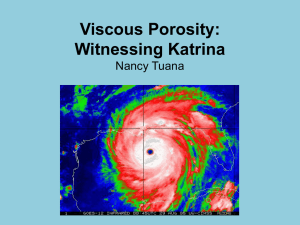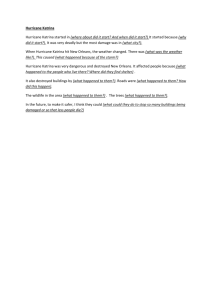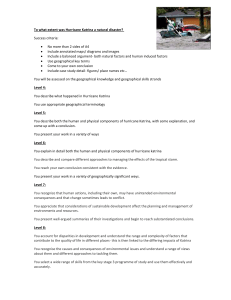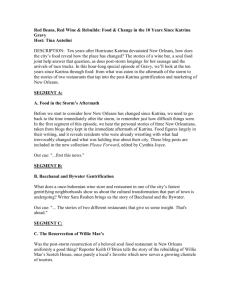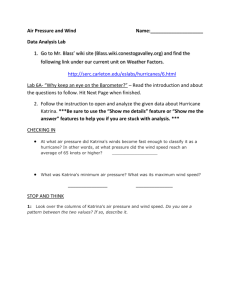Warning Signs, Triggers & Survival Strategies Brought Home
advertisement
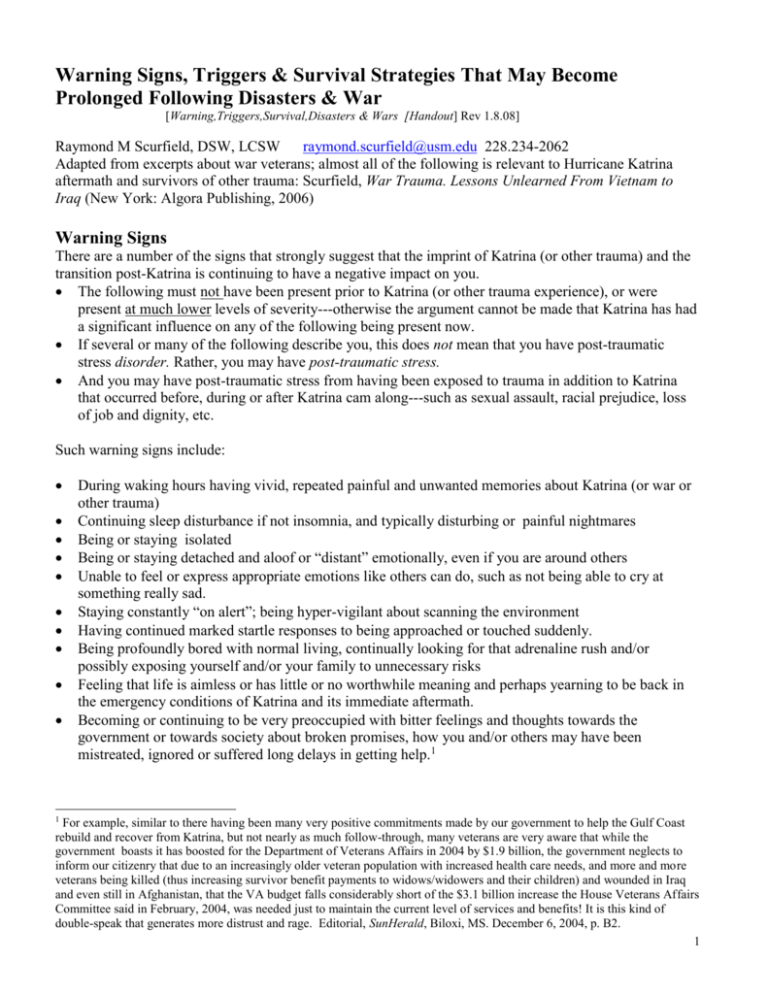
Warning Signs, Triggers & Survival Strategies That May Become Prolonged Following Disasters & War [Warning,Triggers,Survival,Disasters & Wars [Handout] Rev 1.8.08] Raymond M Scurfield, DSW, LCSW raymond.scurfield@usm.edu 228.234-2062 Adapted from excerpts about war veterans; almost all of the following is relevant to Hurricane Katrina aftermath and survivors of other trauma: Scurfield, War Trauma. Lessons Unlearned From Vietnam to Iraq (New York: Algora Publishing, 2006) Warning Signs There are a number of the signs that strongly suggest that the imprint of Katrina (or other trauma) and the transition post-Katrina is continuing to have a negative impact on you. The following must not have been present prior to Katrina (or other trauma experience), or were present at much lower levels of severity---otherwise the argument cannot be made that Katrina has had a significant influence on any of the following being present now. If several or many of the following describe you, this does not mean that you have post-traumatic stress disorder. Rather, you may have post-traumatic stress. And you may have post-traumatic stress from having been exposed to trauma in addition to Katrina that occurred before, during or after Katrina cam along---such as sexual assault, racial prejudice, loss of job and dignity, etc. Such warning signs include: 1 During waking hours having vivid, repeated painful and unwanted memories about Katrina (or war or other trauma) Continuing sleep disturbance if not insomnia, and typically disturbing or painful nightmares Being or staying isolated Being or staying detached and aloof or “distant” emotionally, even if you are around others Unable to feel or express appropriate emotions like others can do, such as not being able to cry at something really sad. Staying constantly “on alert”; being hyper-vigilant about scanning the environment Having continued marked startle responses to being approached or touched suddenly. Being profoundly bored with normal living, continually looking for that adrenaline rush and/or possibly exposing yourself and/or your family to unnecessary risks Feeling that life is aimless or has little or no worthwhile meaning and perhaps yearning to be back in the emergency conditions of Katrina and its immediate aftermath. Becoming or continuing to be very preoccupied with bitter feelings and thoughts towards the government or towards society about broken promises, how you and/or others may have been mistreated, ignored or suffered long delays in getting help.1 For example, similar to there having been many very positive commitments made by our government to help the Gulf Coast rebuild and recover from Katrina, but not nearly as much follow-through, many veterans are very aware that while the government boasts it has boosted for the Department of Veterans Affairs in 2004 by $1.9 billion, the government neglects to inform our citizenry that due to an increasingly older veteran population with increased health care needs, and more and more veterans being killed (thus increasing survivor benefit payments to widows/widowers and their children) and wounded in Iraq and even still in Afghanistan, that the VA budget falls considerably short of the $3.1 billion increase the House Veterans Affairs Committee said in February, 2004, was needed just to maintain the current level of services and benefits! It is this kind of double-speak that generates more distrust and rage. Editorial, SunHerald, Biloxi, MS. December 6, 2004, p. B2. 1 This can become a “me-against-the-world mistrust of what’s to come, an indistinct but entirely accurate perception that this country has failed too many Katrina survivors. The destruction and hurt from Katrina will be around for many years, but will the government be around that long helping out? Being confused, pessimistic, angry about your lot in life and seeing only dim prospects of any positive changes in the future Triggers There are a number of common triggers that may provoke Katrina and other trauma survivors to have surges of unwanted, vivid and troubling memories of trauma return unexpectedly. [This is the cardinal symptom that your traumatic experience may still be of significant trouble or difficulty for you.] Some of you will find yourselves reacting with marked detachment and isolation. Others will find yourselves reacting very strongly to any of the following: Sights, sounds, smells, physical circumstances similar/reminiscent of those experienced during and after Katrina (or that were experienced in other trauma), such as being in oppressive heat and humidity, lack of drinking water, etc. Strong emotional states similar to those experienced during Katrina or in its aftermath, e.g., rage, grief, terror, adrenaline rush Subsequent repeated or new exposure to any trauma by the person or significant others, to include being victims of racism, sexism, sudden poverty....2 Anniversary dates or other significant time anchors such as holidays, birthdays, times of the year that are associated with particular events regarding Katrina or its aftermath. [Hence, for example, every August 29th or August 30th, etc., may well be a troubling anniversary date.] Season of the year, weather, climate, terrain reminiscent of Katrina or its aftermath Media coverage of Katrina (film clips of August 29th, etc.) or of the aftermath of Katrina (i.e., continuing delays in FEMA trailer deliveries) Other major traumatic incidents may occur (that may or may not resemble in some way the original trauma during the war) that bring with them unpleasant reminders of Katrina and its aftermath Theater and television movies that have scenes or themes reminiscent of events that happened during Katrina or its aftermath Music---lyrics and/or melodies that are particularly evocative of or somehow related to the time of Katrina or its aftermath. 3 Experiences of loss---divorce, separation, death of significant others, loss of job, sudden geographic relocation, loss of body parts or bodily functions, impending death.... Contacts or conflicts with authorities: medical, clinical, governmental, religious, job supervisors . . . Disaster Survival Strategies That May Become Prolonged Fight or Flight You meet and engage in active coping and surviving actions in the face of Katrina (or other trauma). Conversely, in the face of overwhelming environmental disaster (or other trauma), you choose to leave and get away. These are the two classic and instinctual survival strategies that have been genetically imprinted in human beings over the millennia, instinctual responses that have ensured the survival of the human species from the days of the cave dwellers and up through modern times. 2 For example, VFW officials in 1994 reported a significant increase in disability claims from World War II veterans, whose nightmares were dramatically revived by the media coverage surrounding the 50 th Anniversary of D-Day. Corbett, p. 40. 3 My thanks to my good friend Angelo Romeo for reminding me of the power of certain songs. For Ange it is the Beatle’s “Hey Jude”—a song that I also found particularly evocative of melancholy states I would find myself in while stationed in Vietnam. 2 Conversely, there is a potential downside to this dual survival strategy. A number of Katrina survivors, after they have left the coast with Katrina bearing down, or who then have stayed away, or even after they return, may have found themselves plagued with feelings of guilt, shame, grief or unremitting rage over what they did to survive (flee) or survive during Katrina (or other trauma). And so this may be bothering you now, and/or it may come back to haunt you months or years from now. Detachment, Numbing And Denial You learn how to protect yourself against the horrors of what you are witnessing and do so by convincing yourself that “it don’t mean nothin’ ”, no matter what happens. You learn to self-anesthetize to not feel what otherwise would be overwhelming---anxiety, fear, shock, horror, depression, loss, grief. This was described by a war veteran about himself and his cousin who were plagues for years about horrors they had been exposed to: Somehow along the way, Dub and I both managed to put up a wall around this issue [the recurring traumatic memories]. There is nothing honorable in killing. Nothing is as horrible as the inner soulrendering scream that comes with the first time. Then the numbness comes to silence it. Numbness is a narcotic to the soul. Numbness takes over your life and has a death grip on you until (if) you finally reach a point of total security with being home among family and friends. There is nothing to glorify what we do in war. 4 A number of Katrina survivors who cannot forget traumatic experiences that happened during Katrina or in its aftermath (i.e., exposure to dead bodies, sheer terror as the waters continued to rise) and/or in the face of seemingly unrelenting stress, duress and severe challenges post-Katrina, may find such numbing, detachment or denial to be a refuge from the terrible memories or continuing struggles. Furthermore, you may get so good at detachment, denial and emotional numbing that you carry this with you long after Katrina, war or other trauma has passed. For example, a number of family members of war veterans have described their veteran family member as not able to show or perhaps even feel normal emotions like everyone else and that they are emotionally inaccessible. Tunnel Vision In the face of Katrina and/or the continuing, seemingly relentless challenges and stresses post-Katrina, you learn how to maintain an intense, focused, full attention in order to complete particular tasks and become impervious to whatever else is going on around you. Yes, you learn to focus all of your energies and attention on completing the immediate task or objective, such as physically exerting tasks, preoccupation with completing various disaster applications and follow-through (because there always must be followthrough, time and time and time again!) ---to the exclusion of every thing else. This can be a good, or a bad, skill and attitude that you carry with you. You may find that tunnel vision helps you to get through tough times in post-Katrina life. Conversely, you may find that tunnel vision has become so second nature that you have great difficulty or find it impossible to ever turn it off. And this can be devastating to relationships, or to be able to enjoy life fully. External Discharging Of Emotions Finding an outlet for the inevitable cumulative build-up of stress, frustration, grief, fear and rage that are inevitable in a post-Katrina devastation is crucial to surviving. There will be an accumulation of pent-up emotions and these demand an outlet. Such rage may be channeled towards whoever is considered to be 4 J.P. McDonald. Letter to the Editor, The SunHerald, Biloxi, MS. November 12, 2004, p. D-2. 3 “the enemy” – the feds, FEMA (yes, admit it, if you are being paid through FEMA, do you hide that fact?), national, state and/or local officials, etc. Such channelized rage, if it is controllable and more anger than rage that you remain in control of, can be very functional, or it can fuel you internal anger in a way that promotes your own resolve that you will persevere, no matter what.. Conversely, there may be an absence of regular opportunities to discharge such pent-up emotions, which is especially likely when there are not readily available targets for such rage—or in a war that is waged by guerillas, insurgents or terrorists. Thus, pent-up emotions can erupt strongly and unexpectedly, to include possibly towards innocent people, and even towards family, friends, neighbors or random persons that you meet. This is because the pent-up emotions have to go somewhere. If not expressed outwardly, you may well redirect such feelings inwardly or suppress them, keep pushing them down. And you can carry this home with you, and find it very difficult to share what is going on with you with your family members or even with your close friends. It might continue to build up and then you explode in anger, frustration or grief. Or, you may isolate in an attempt to avoid possibly having your deep emotions and memories triggered or to prevent venting your emotions against others. Belief in Fate/Randomness/Higher Power Many survivors of trauma, to include natural disasters and war, rely on their long-standing faith in a higher power or Supreme Being to sustain them through the horrors of what they are and have faced. Others find their faith and beliefs severely challenged, or decimated when they come face-to-face with the horrors and inhumanity and seemingly random nature of who was hurt the most and the least. For example, the first question that some soldiers often ask after something bad has happened in the warzone is, “Why me, God?” Or, “Why did this have to happen to ___, God?” And other soldiers will ask: “Why me, God”, and “There is a God and I need to reconnect.” Also, there is the issue of morality in a war-zone, such as: “thou shalt not kill” (especially women and children), “thou shalt not commit adultery,” and “what you do to the least of my brethren you do unto me.” This is exactly what many Katrina and other disaster survivors face. Why did this happen to me? How could a caring God allow this happen to so many good people? And there is the issue of morality. Do you know folks who purposefully exaggerate or lie about claims of damages and loss from Katrina? Do you know folks who have taken money or goods from any organizations providing disaster relief--even when they didn’t really need it or others needed it much more than you or other? Also, ministers, priests and chaplains can be a source of great comfort and counsel to disaster survivors. You may find yourself wondering how can there be a God or higher power who would allow people, and you, to do what they and you do to each other to survive, such as looters in the immediate aftermath of Katrina, or people who took and took and took but never gave. You may feel blessed at your good fortunate, or feel that God abandoned you or others. [Tip: When talking around other Katrina survivors who had significant problems during or fter Katrina, please consider that if you say “I was blessed” or “Our family is blessed” (that our home was not destroyed, etc.) when you are around others who were less fortunate, that they may take such a comment to mean that they were not blessed, that you may be implying—even if you are not—that God looked out more for you than He did for them . . . ] 4 Problematic Survival Strategies That May Be Prolonged There are additional survival modes that can be very or at least somewhat functional to getting through the immediacy of the dangers and stressors of Katrina and other trauma. However, they almost always have very serious associated negative impact in ways that almost never are positive to either shorter- or longerterm post-trauma behaviors, mental health, happiness or positive readjustment. I will just briefly mention each of these here. 5 “Comparing” traumas One of the most problematic survival strategies is to compare what you went through with, what your trauma was, with what others went through and to either (1) be bitter, dismayed or depressed that you suffered much more than many others did, or (2) compare your trauma experience as somehow not being as terrible or bad as others. In this latter scenario, you: deny that you are entitled to be having the negative or troubling reactions that you are having and become very self-critical at your own “weakness” or you do not allow yourself the right to feel how you are feeling or what you went through or you feel guilty that you are having the troubling feelings that you are having because “your trauma was nothing compared to so many others. “Hey, all the media attention is on New Orleans and Louisiana. What about Mississippi? We have suffered much worse trauma than they have.” “Why are so many people still in FEMA trailers? Time to move on with their lives.” (versus having continuing compassion and understanding for such situations) All of these are no-win propositions. Your traumatic experience was your traumatic experience, period. It was and is meaningful to you and to “compare” traumas is not fair to anyone. Be Enraged If you are going to allow any feelings to emerge, you let it be the one emotion conducive to survival in the face of trauma and continuing overwhelming stressor --rage directed at whomever you consider to be the enemy. Unfortunately, this is extremely difficult to do when the enemy is a large, amorphous bureaucracy—like an insurance company or FEMA, where there is no easy target to vent your rage and frustrations towards. You can become increasingly agitated and frustrated, if not undependable, unstable or engaging in inappropriate acting out against others. And you can continue this unsatisfied, pent-up rage, impulsive and other inappropriate behaviors long after Katrina has come and gone . . . Isolation Isolating oneself from others, not letting anyone get close emotionally is another common way to promote detachment. The remarkable bonding that occurs among fellow and sister trauma survivors during and in the more immediate aftermath of trauma is a two-edged sword. It helps you to survive the otherwise unsurvivable. On the other hand, when you lose a close family member or friend (through death, moving away, never coming back), it can be devastating. And so a number of survivors decide not to let anyone get too close---because it hurts too much when they are gone. And they carry this attitude with them. And they might get to the point where they believe that only other survivors of Katrina (or other trauma) who experienced what they did—and who feel like they are feeling---could possibly understand them; and those are the only people they want to be around, because they find that they cannot feel very comfortable with almost anyone who isn’t a fellow or sister survivor. Still others vets find themselves avoiding any 5 Discussed in depth in A Vietnam Trilogy. 5 meaningful discussions or interactions with other survivors, and don’t want to talk about it or hear others talk about it---because it brings back too many disturbing memories and too much pain. Drinkin’ and Druggin’ Substance use and abuse are two of the most common tactics for trauma survivors to use to achieve detachment and relief, And what were some of the first businesses to open after Katrina---liquor stores and bars and taverns. And for military personnel, the military historically has made cheap or even free alcohol readily available. And so, many people who may had had substance use problems prior to Katrina (or war or other trauma) may turn out after the trauma to have an even bigger substance use problem—because this is how they characteristically respond to stress and unhappiness. And for a number of Katrina (and war vets) who did not have substance-use problems before the trauma may well turn out post-trauma to have a big problem. And this can become or continue as a habit, even when the aftermath of Katrina/other trauma fades into the background if you are someone who has learned to rely on substances to numb out and get temporary relief when things get rough or you’re feeling down. Risk-Taking/Thrill/Sex Addiction Another survival strategy is to become immersed in and “addicted” physiologically, psychologically and behaviorally to the thrill, the risk, the danger, the adrenaline rush. And sex may become readily available as people take advantage of each other. Sex can be bought, or forced and yet another way to anesthetize yourself and provide a relief from the intensity and loneliness of post-trauma life. Or, you can become action junkies in other ways, which can be a powerful elixir to help you survive, or it can lead to increasingly more dangerous attitudes and behaviors. And needing this rush may become extremely difficult to simply turn-off or satisfy when the trauma-induced emergency conditions begin to fade and unrelenting normalcy, day-to-day, sets in. However, some of you will be able to constructively sublimate the adrenaline habit through successful post-trauma employment in high-risk, high-thrill occupations and jobs such as, post-disaster relief, emergency medical, fire and rescue, law enforcement, off-shore and oil pipeline, contract positions in support of military operations. Conversely, others of you will satisfy the risk/thrill/sex addiction craving by constantly looking for life on the edge, the extreme, unsafe high-risk behaviors and/or stay immersed in memories and feelings about Katrina, or war and danger. As an example of dangerous risk-taking, an alarming number of recently returned Iraq Army and Marine veterans have been killed in single-occupant vehicle accidents. We absolutely have a problem . . . The kids come back and they want to live life to its fullest, to its wildest. They get a little bit of time to let their hair down, and they let their hair all the way down and do everything to excess. They drink to excess They eat to excess. They part to excess. And then, some drive . . . They want something that goes fast and keeps that high up they had during the war . . . speed fills some indescribable urge for excitement that they’ve felt since returning from war . . . Going fast is like a drug---the newest crack out there. 6 Or, you may just find yourself bored with everyday life routines that have settled in. 6 From October 2003 to September 2004, when troops first returned in large numbers from Iraq, 132 soldiers died in vehicle accidents, a 28% jump from the previous 12 months. Two-thirds of them were veterans of Iraq or Afghanistan. And there was a 23% increase in deaths from vehicle accidents in the past seven months. Gregg Zoroya, “Survivors of war take fatal risks on roads.” USA Today. May 2, 2005. Accessed on-line 5.2.2005. 6 Bizarre Or Gallows Humor In the midst of horror and chaos, resorting to what otherwise would be seen as gross or inappropriate humor can be at least a partial anti-dote to the trauma of Katrina and the destruction and disruption that has characterized its aftermath. One veteran’s humor: Hey, John: we seem to have an extra leg among all these body parts from the last mass casualties we received. Since I can’t figure out which body it belongs to, I’m going to give this here guy a third leg---that’ll give the body handlers stateside a little surprise when they open up the body bag. And what are examples of bizarre or gallows humor among disaster recovery workers, police/fire/emergency medical first responders and Katrina survivors? It helps to stop you from crying, or becoming overwhelmed by what you’re facing day after day after day. Instead, you can get a deep belly-laugh, a moment of absurdly hilarious respite, a closeness and comradeship with the only people who could possibly get it or tolerate such humor---your buddies who have experienced and lived with what you have experienced and lived with. But, if taken to the extreme, it really is a temporary respite; it is nasty, and it doesn’t erase the horror from your mind or from your heart. And you can carry that bizarre humor with you in either a positive or negative way. Positively, you may be able to have an irreverent attitude, an enjoyable or refreshingly unexpected or amusingly sarcastic or humorous attitude that at least some others may find to be a welcome respite, especially during tough times. Or, you can have a really sick, pejorative, nasty, insulting attitude and behavior and you can be really inappropriate towards others, and could care less. Or, perhaps you fall somewhere in-between (like I have been accused of at times). Dehumanizing or Criticizing of Others Do you find yourself getting resentful and intolerant of those who seem unable or unwilling to “let go” of being a Katrina victim, and keep waiting, and waiting, and demanding, and demanding even more, and continue to keep taking and taking and taking? Do you find yourself feeling less and less compassionate or concerned by some who seem to be stuck in a post-Katrina “poor me” attitude? (It may be that you are suffering from “compassion fatigue.”) Do you find yourself being increasingly upset that while others seem to be moving ahead with their life, that you or some of your family or friends seem stuck and left behind and that life is not getting much better for you or for your loved ones and that you are being forgotten about or criticized for not having gotten your life together? Are you too caught up in blaming the insurance companies, FEMA, other disaster relief agencies, local government, developers and lack of affordable housing and sky-rocketing rental prices, etc., that you find it hard to focus on what you can do to increase your personal life satisfaction and life circumstances? PS: There is an ancient Yogic expression: “What you put attention on grows in your life.” What are you putting your attention on? END 7

